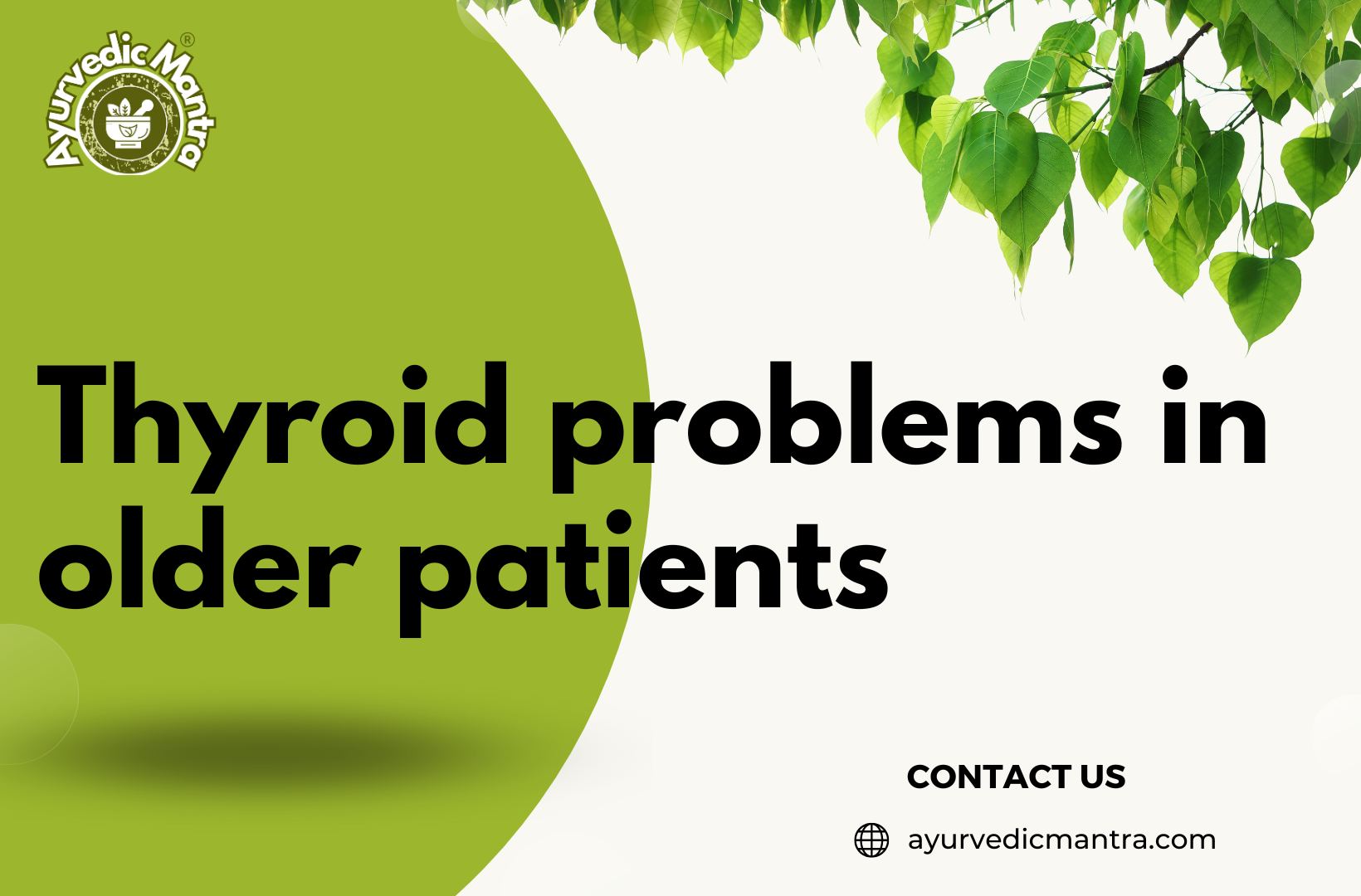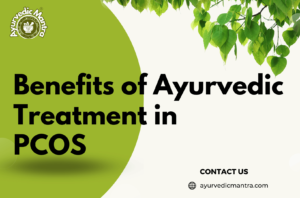
PCOD/PCOS: Ayurvedic Treatment is Best
Introduction Polycystic Ovary Disorder (PCOD) or Polycystic Ovary Syndrome (PCOS) is a common endocrine disorder affecting millions of women worldwide. It leads to hormonal imbalances,


Our bodies undergo numerous changes as we age, and the thyroid gland is no exception. The thyroid regulates metabolism, energy production, and overall well-being. In older patients, however, thyroid problems can manifest differently and require specialized attention. This comprehensive guide will delve into the various thyroid issues that older individuals may encounter, shed light on their symptoms, and explore effective management strategies to ensure a healthier and more vibrant life.
Aging can impact the thyroid in various ways. One common phenomenon is thyroid atrophy, where the gland gradually shrinks in size. This natural reduction in thyroid tissue can lead to a decrease in hormone production, potentially causing hypothyroidism. Additionally, nodules may develop in the thyroid, requiring careful monitoring to rule out malignancy.
Identifying thyroid problems in older patients can be challenging, as symptoms may overlap with other age-related issues. It’s crucial to recognize the signs, such as unexplained weight changes, fatigue, and fluctuations in body temperature. Older individuals might also experience cognitive changes, depression, and cardiovascular irregularities due to thyroid imbalances.
Hypothyroidism, characterized by an underactive thyroid, is prevalent among older adults. The condition can exacerbate age-related metabolic slowdown, leading to weight gain, constipation, and joint discomfort. Levothyroxine, a synthetic thyroid hormone, is the cornerstone of treatment. Proper dosing is imperative; regular thyroid function tests are vital to ensure optimal results.
Conversely, some older individuals might experience hyperthyroidism, an overactive thyroid condition. This can accelerate metabolism to an unhealthy extent, resulting in unintended weight loss, rapid heartbeat, and anxiety. Anti-thyroid medications, radioactive iodine therapy, and in some cases, surgery are avenues of treatment to restore thyroid balance.
Maintaining the delicate equilibrium of thyroid hormones is pivotal for older patients’ well-being. Factors like nutritional intake of iodine and selenium and certain medications can influence thyroid function. Consulting a healthcare provider before taking supplements is crucial to prevent interactions and ensure hormone stability.
Promoting thyroid health extends beyond medical interventions. Encouraging older patients to adopt a balanced diet rich in whole grains, lean proteins, and fruits and vegetables can provide essential nutrients. Furthermore, stress management techniques like yoga and meditation can support hormonal equilibrium. Adequate sleep and regular physical activity also contribute positively to thyroid function.
Routine screening for thyroid dysfunction is paramount for older adults, even without noticeable symptoms. Thyroid-stimulating hormone (TSH) levels should be monitored regularly to detect deviations from the norm. Early detection enables timely interventions, preventing potential complications and ensuring a higher quality of life.
While thyroid cancer is less common in older patients, it’s still crucial to address. Regular screenings and ultrasound imaging can help identify any suspicious nodules or growths. Surgical removal of the thyroid, followed by radioactive iodine therapy, is the standard treatment protocol if malignancy is confirmed.
Older patients with thyroid issues benefit immensely from a collaborative healthcare approach. Endocrinologists, primary care physicians, and registered dietitians play pivotal roles in diagnosing, managing, and treating thyroid problems. Open communication and shared decision-making empower older individuals to participate in their healthcare journey actively.
In conclusion, understanding the intricacies of thyroid problems in older patients is vital for fostering a healthier aging process. Individuals can take charge of their thyroid health by recognizing the symptoms, embracing a holistic approach to care, and engaging in regular screening. With the guidance of dedicated healthcare professionals, older adults can enjoy a more vibrant and fulfilling life, free from the constraints of thyroid dysfunction.
Remember, a well-crafted strategy encompassing medical expertise, lifestyle modifications, and proactive management is the key to unlocking the doors to optimal thyroid health in your golden years.
A1: Older individuals commonly experience two main thyroid problems: hypothyroidism and hyperthyroidism. Hypothyroidism refers to an underactive thyroid, where the gland doesn’t produce enough hormones, leading to sluggish metabolism and fatigue. On the other hand, hyperthyroidism is characterized by an overactive thyroid that accelerates metabolism, causing unintended weight loss, rapid heartbeat, and anxiety.
A2: Distinguishing between aging-related changes and thyroid dysfunction symptoms can be challenging. While some symptoms, like fatigue and cognitive changes, might overlap, specific indicators such as unexplained weight changes, changes in body temperature, and mood fluctuations are more indicative of thyroid issues. Regular medical check-ups and thyroid function tests are essential for accurate diagnosis.
A3: Yes, thyroid problems can contribute to mental health issues in older patients. Hypothyroidism, for instance, can lead to symptoms like depression, cognitive impairment, and memory difficulties. Hyperthyroidism, on the other hand, may cause anxiety, irritability, and mood swings. Proper management of thyroid dysfunction can help alleviate these mental health concerns.
A4: Diagnosis involves a combination of clinical assessment and laboratory tests. Blood tests, including thyroid-stimulating hormone (TSH), free thyroxine (T4), and free triiodothyronine (T3), help evaluate thyroid function. Imaging studies like thyroid ultrasound may be conducted to assess structural abnormalities. A comprehensive evaluation by a healthcare professional is crucial for accurate diagnosis.
A5: Treatment depends on the specific thyroid condition. For hypothyroidism, levothyroxine, a synthetic thyroid hormone, is the primary treatment, with dosage adjustments based on TSH levels. Hyperthyroidism can be managed through anti-thyroid medications, radioactive iodine therapy, or surgery. In the case of thyroid cancer, surgical removal of the thyroid, followed by radioactive iodine treatment, might be necessary.
A6: Absolutely. A balanced diet rich in nutrients like iodine and selenium is beneficial. Incorporating whole grains, lean proteins, and fruits and vegetables supports thyroid function. Stress reduction techniques such as yoga and meditation, regular exercise, adequate sleep, and avoiding tobacco and excessive alcohol contribute to overall thyroid health.
A7: Regular thyroid screenings are crucial, even without symptoms. Annual screenings are recommended for older adults, especially considering the potential impact of thyroid dysfunction on overall health. Early detection of any abnormalities allows for prompt intervention and better management outcomes.
A8: Yes, thyroid dysfunction can impact cardiovascular health. Both hypo and hyperthyroidism can change heart rate, blood pressure, and cholesterol levels. Hypothyroidism is often associated with high cholesterol and an increased risk of heart disease. Proper thyroid management, cardiovascular monitoring, and a healthy lifestyle can help mitigate these risks.
A9: While certain supplements like iodine and selenium are important for thyroid function, it’s crucial to consult a healthcare provider before starting any supplementation. Excessive iodine intake, for example, can be harmful. Collaborating with a medical professional ensures a balanced approach and prevents potential medication interactions.
A10: Collaborative care involves a multidisciplinary approach, where healthcare providers, including endocrinologists, primary care physicians, and registered dietitians, work together to diagnose, treat, and manage thyroid issues. This approach ensures comprehensive care, personalized treatment plans, and better outcomes, empowering older patients to participate actively in their health journey.

Introduction Polycystic Ovary Disorder (PCOD) or Polycystic Ovary Syndrome (PCOS) is a common endocrine disorder affecting millions of women worldwide. It leads to hormonal imbalances,

Introduction Losing weight is a journey that requires dedication, consistency, and self-care. While there are numerous weight loss techniques out there, not all of them

Polycystic Ovary Syndrome (PCOS) is a hormonal disorder that affects millions of women worldwide. It can lead to various health complications, such as irregular periods,

In recent years, Ayurveda, an ancient system of natural healing originating from India, has gained significant popularity as an alternative approach to treating various health

आजकल वजन बढ़ने और चर्बी की वृद्धि होने की समस्या एक आम समस्या बन गई है। बढ़ते वजन और अतिरिक्त चर्बी के कारण न केवल

प्रस्तावना: आजकल वजन बढ़ने और ओबेसिटी की समस्या एक आम समस्या बन गई है। बढ़ते वजन के कारण न केवल शारीरिक समस्याएं होती हैं, बल्कि
